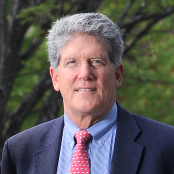The Final Word on the Alumni Fund’s Fiscal Year—and Thoughts from Senior Vice President for Development and Alumni Relations Scott Meiklejohn
By Bowdoin NewsWith $9,894,534 million in gifts from 9,253 alumni donors to close out the Alumni Fund’s 2021 fiscal year that ended June 30, 2021, Senior Vice President for Development and Alumni Relations Scott Meiklejohn, who will soon transition to a new role as senior advisor at Bowdoin, shares his perspectives on the value of the 1794 Society’s contributions and the outlook for the College.

How has the pandemic affected your fundraising outreach and how has it affected alumni and their support of the College?
I am grateful that so many alumni have kept Bowdoin as a priority in tumultuous times. We’ve had our two best fundraising years in Alumni Fund history in fiscal 2020 and 2021—not surprising given what I know about Bowdoin but amazing, really, in the face of so many challenges for individuals, families, and organizations around the world. It’s a great testament to the loyalty of the Bowdoin community.
Last year, President Rose predicted the College would face its most significant deficit in its history in fiscal 2020–2021. How has Bowdoin managed this?
The College went into the pandemic with financial strength built on three things: exceptional long-term endowment performance, strategic accumulation of reserves, and generous annual contributions from alumni, parents, and friends. We have leaned on all three of those pillars to navigate pandemic-related costs. Bowdoin was able to make decisions that were grounded in providing the best possible education, preserving student safety, the health of our wider community, and the welfare of our employees. We got called out for making what some viewed as financially motivated decisions, but I didn’t see any of that in our senior officer meetings throughout the crisis. We ended up on nearly the most expensive path (for the College) that we could have chosen. Bowdoin is strong and we will emerge on the other side of it in very good shape.
What is Bowdoin’s greatest financial need right now?
We are about 80 percent of the way to our $500 million campaign goal, and the campaign’s capital priorities around financial aid, internships and career exploration, and the excellence of the academic program have seemed even more correct amid the turmoil of the pandemic and everything else that’s been going on. I’m confident we will reach those goals while staying true to Bowdoin’s priorities around annual giving; most alumni, parents, and friends will be campaign donors because of their continued, generous annual support, whether it’s an unrestricted gift or designated to an area of special interest to the giver.
How important is the 1794 Society membership and what role does it play in the Alumni Fund?
Leadership matters. Our Alumni Fund results have been driven by broad participation, for sure, but the record cash results are because of the generosity—and during the pandemic, the extra generosity—of alumni and parents who support us at the 1794 level. Some of the first calls and emails I got in March 2020 were from members of the Bowdoin family who said they were sending additional support to underwrite what they knew would be unusual but, at that point, unknown costs.
How do you see fundraising in higher education changing in the next five to ten years?
Answers to that question tend to have themes about analytics and more sophisticated use of data, and those are certainly priorities for us. I also hope that Bowdoin will continue to be among the national leaders in highly personal alumni and parent engagement—not just in fundraising, but in the life of the College more broadly. There are not many areas where Bowdoin is willing to throw down and say that we aim to be the number-one program in the US. Bowdoin doesn’t usually make that much noise about itself. Alumni participation in volunteering, events, and giving is a place where we have been first before and it’s just my two cents, at this point, but I believe we can be number one again. Soon.
Having worn so many hats in your nearly quarter century at the College—working first in development and alumni relations (DAR), then in the president’s office, as dean of admissions and financial aid for eight years, and most recently leading DAR—have you seen a common theme in terms of Bowdoin’s strength and what makes it the special place that it is?
I have been very fortunate to hold the positions I’ve had, and to contribute to the College in different ways—or perhaps I should say, it’s been my good luck not to hold any job for very long at Bowdoin. Bowdoin has become important to me in ways that I could not have imagined when I started; my life is infinitely better because of the Bowdoin people who are now part of it. I have always been motivated by the way that Bowdoin holds open the door to talented students who can’t easily afford it, and by the prominent place that financial aid has had in every conversation about core values at the College. Our commitment to access and opportunity and our choice to be in a handful of colleges doing the most with financial aid make me proud.
What can you tell us about your new role as senior advisor?
I will be telling Bowdoin’s story, trying to be as helpful to the team as possible, and recognizing my good fortune to have one more chapter.